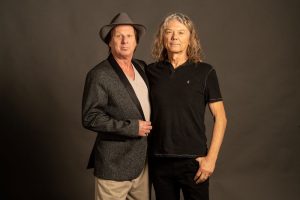
Legendary guitarist Adrian Belew was kind enough to spend some time talking with us as he waited out a fire drill in his Denver hotel on the eve of the “Remain In Light” tour that launches at the Ogden Theater here in Denver on February 16th (tickets available here).
Belew shared some interesting stories about his contributions to several seminal albums of the 80’s and 90’s and even recounted his first meeting with Phish’s Trey Anastasio (who was profoundly influenced by Belew’s playing). Come on a little a journey with a true journeyman of the Rock and Roll world and then check out the show at the Ogden on February 16th!
Listen Here Denver!: Are you out here in Denver yet, or are you en-route?
Adrian Belew: Yes I’m here, snow and all. Today we have rehearsals around 3:30 so I’m waiting for that. We really don’t need a lot of rehearsal at all. It’s because we’re so used to playing every few weeks because we’ve played a lot of festivals and you don’t play those in a row. But this is the beginning of our tour where we will be playing, I think, 19 shows in a row, and then we come back in June and play 17 more. So yeah, it starts right now.
Listen Here Denver!: That’s awesome, man. So you haven’t toured this before? It’s only been festivals, is that right?
Adrian Belew: Well, yes, I think we’ve done about a dozen festivals. The last one we did previous to this at the end of last year was Hardly Strictly in San Francisco, and that was for 100,000 people. So we’ve kind of run the gamut from small festivals to the large festivals and now to theaters.
Listen Here Denver!: So when you first started doing this, it was with Turkuaz, right?
Adrian Belew: Yes. Originally, Jerry Harrison and I were looking how we would do this. How could we go back and relive this experience and what happened is he produced a band called Turkuaz who was based on Talking Heads music. That’s why they started the band. And they had been playing together for ten years, and he said, this band is perfect for us. We can just add ourselves to the band and away we go. It worked out beautifully. Two members left along the way somewhere, and one was the bass player, who we replaced with my bass player, Julie Slick from my trio who’s played here in Denver many times. It’s an eleven piece band with a three piece horn section, two female backup singers, several guitar players, keyboard players, percussionists, drummers. I mean, we got it we got it all on the stage. It’s a big band.
Listen Here Denver!: That’ll be great on that Ogden Theater stage. That will be fantastic.
Adrian Belew: Yeah.
Listen Here Denver!: All right. So is Cool Cool Cool essentially the new Turkuaz?
Adrian Belew: That’s right. I meant to mention that. So they open the show for us. And yeah, they’re the new version of Turkuaz. I’m sure it’ll be great. They’re all really great players and really great people. I enjoy working with them.
Listen Here Denver!: That’s fantastic. I’m definitely looking forward to that. I’ve seen Turkuaz several times, and it’s always fun.
Adrian Belew: Yeah, great band.
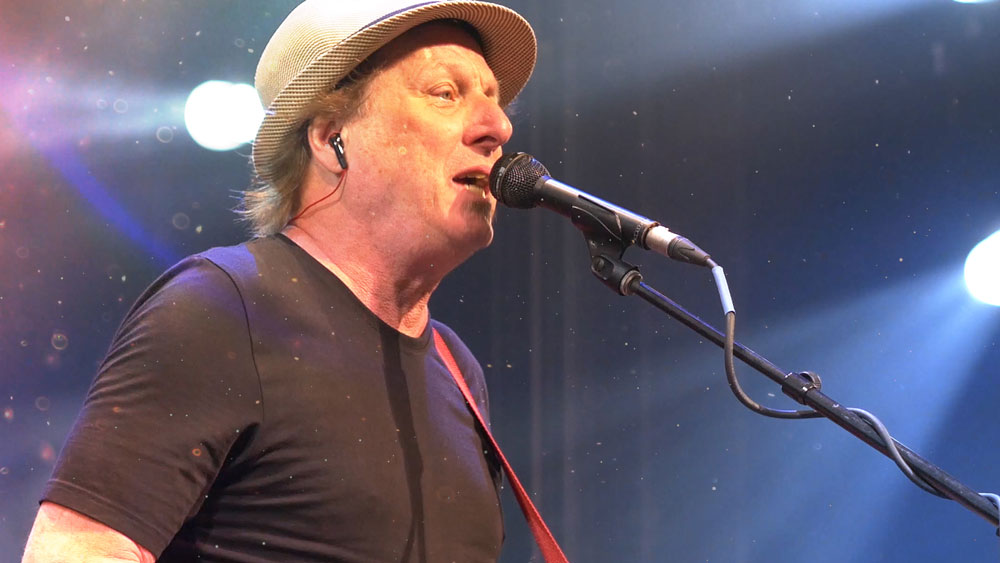
Listen Here Denver!: So, going back in time a little bit here, how did you initially become involved with the Talking Heads and Remain In Light specifically?
Adrian Belew: It kind of starts with me playing with David Bowie and Madison Square Garden and the Talking Heads sitting in the second row up front. That’s when they first saw me play, and I think they really loved what I was doing. Next they went on tour for Fear of Music, the album. That was right before Remain In Light, and I went to three of their shows on the third show – by then we were kind of getting to know each other – they said, “would you like to come out and play the encore with us? It’s called ‘Psycho Killer’.” I said, well, yeah, I know that song very well, but I’ve never worked out the chords and things. And they said “that’s okay. Just come out and go wild like you do.” So that was really our bonding moment. Then I was playing at some time later in New York City doing a showcase to try to get a record deal for myself. After the show, David (Byrne) and Jerry and Brian Eno were there – I always say they cornered me in the stairwell because that’s exactly what happened – and they said “we’re making a record. Can you possibly stay and record on this record we’re making?”
Adrian Belew: So that’s what happened. The next day, I recorded all day with them, just the three of them. Chris and Tina had already done all their parts, so they weren’t there. But of course, later on, Chris, Tina and I made the Tom Tom Club record, too.
Listen Here Denver!: Okay, that makes sense. So you were involved just one day of recording for that?
Adrian Belew: I could only stay one day because I had my band with me and I couldn’t afford to just keep them all sitting around for a week in New York City. Yeah, I got everything I wanted to do in one day. I’m fast in the studio, and plus, they gave me complete license. Do whatever you want, add whatever you want. We just want lots of colors, solos and sounds and all the stuff that you do. To give you an example, there was a song, there was a track they had that was in the key of E all the way through, no chord changes. Perfect for a guitar player to go wild on and they said, “go out in the studio and listen to the song, and when you think there should be a guitar solo, put one in, and we’ll write the song around it later.” So I did. I played the first solo, and I looked in through the studio glass and I saw them freaking out, jumping up and down, having a great time. So I thought, well, that went well. Let me wait and put a second one on there. That is a song called “The Great Curve”.
Listen Here Denver!: And then after that, they obviously were impressed with what you had done and they invited you to join the touring band. Is that right?
Adrian Belew: That’s right. Well, the Remain In Light record is unusual in the sense that it’s layers and layers of sounds. It’s not the four piece band like it had previously been on their records. So, in order to play that record live, they had to import some other players. And of course, since I had actually played on the record, it seemed logical for me to be part of it. We had just four days rehearsal. We flew up to Mossport, Canada, did the Heat Wave Festival, and they put us in helicopters to fly out to the festival. As we looked down, we saw it was 70,000 people. Wow! Our first show that we’d ever played on-stage together. The next one was in Central Park, and that was 125,000 people. So as we traveled the world I just could feel that Talking Heads were finally breaking through and becoming superstar material. It was really interesting to be there at that time, be on stage and watch that happen. The audiences grew and grew, and they just were so excited everywhere they went. The one that I always point to on YouTube is the live concert called Talking Heads – Live in Rome 1980. That show is kind of what made us decide to do this. Jerry and I said, that show just shows you what we did then and how exciting it was and how fun it was and how everybody just had such a great time. That’s what the band was. It was a groovy band. You danced to the songs, and at the same time, they were kind of unusual. Intellectual, avant gardish, even.
Listen Here Denver!: Pretty seminal time for that band. And for that kind of music in general.
Adrian Belew: Yeah, it was different enough that you’d never heard anything really quite like it. And now, of course, I think people think of it as a milestone.
Listen Here Denver!: Absolutely. So what is it about this music that brought you back to it after all these years? You mentioned Jerry working with Turkuaz and that kind of thing, but when you really came up with the idea, what was it that led to the genesis of that?
Adrian Belew: I had been thinking quite a while about that particular period of time and that band and the reaction it got from the audience. And I always felt like the world needs that kind of band again right now. It really does, because there’s a positivity about it. People go to the show, they just have the best time of their lives and they leave smiling and they’re happy and it takes them away from whatever’s going on in life. We talked about it for more than a year or two because every time I would go play in San Francisco, Jerry would come to the show and we’d talk about it. But we couldn’t figure out the logistics of doing it. We finally did have the logistics figured out when he produced Turkuaz. He called me and said, I think I have the solution.
Listen Here Denver!: So you obviously have quite the resume and worked with some of the most legendary artists in the business Frippe, Bowie, Zappa, Byrne, Paul Simon, et cetera. Can you talk a little bit about who had the biggest impact on your personal style, your musicianship?
Adrian Belew: I always feel like the people who influenced me the most, maybe this is true of a lot of musicians, are the people and the music that happened long before I ever hit the big stage. You know, the music of my youth, The Beatles and The Kinks and Jimi Hendrix and even King Crimson. That’s kind of when I figured it all out for myself and began to teach myself how to play lots of different ways and styles and realized that I really excelled at making the guitar do unusual things. So I tried to put a lot of time and effort into that because it gave me my own space in the giant universe of guitar players. Those are the things that I always return to in my mind. I think some of those things surface now and then as inspirational things in my own music. It was very interesting to eventually be in King Crimson and that would have shocked me back then if I had known. I’d probably have had a heart attack.
Listen Here Denver!: So it was really that these guys kind of heard what you were doing and found a place for it in what they were doing.
Adrian Belew: That’s exactly what I think everyone saw after a while. Nine Inch Nails – I did four of their records – was the same as doing the Talking Heads. Go in and do whatever you want to do, and we’ll choose from it later what we want to use. So that’s what people seem to do because I can offer a lot of ideas. Like, Trent (Reznor) will say, “here’s a track. It’s got very little on it. Can you think of something you’d like to do?” And I’ll say, “yeah, I’ve got five ideas. Let me go do them.”
Listen Here Denver!: So you were involved with two of my favorite albums of all time in Graceland and Rhythm of the Saints and just curious how you hooked up with Paul Simon and what that process was like for you. He was really breaking some new ground at that point.
Adrian Belew: Laurie Anderson, who I’ve done records with, told Paul Simon about me, and she said, “if you’d like to have someone on your record who can make sounds no one else can make, he’s a guitar player who doesn’t really sound like a guitar player.” So that’s how Paul was introduced to me. Now I’ll tell you a little story. The first day I went in – I had four days booked in the studio – I got there a little early, and I noticed the tracks that the engineer was listening to. They were African music tracks, so I didn’t pay a whole lot of attention. Then Paul arrived, and after a little chit chat, getting to know each other, getting some coffee and stuff, we went in the studio and he said, “so this is the material.” And I said, “oh my gosh. Well, I’m surprised. This doesn’t sound like you at all.” And he said, “well, here, let me show you what I’ve been doing. I’ve been studying this music for three years to try to change the direction of what I do.” And so he played a track and would stand right next to my ear and really softly sing. He’d say, “well, I don’t have all the words. Here’s some of the words.” And he’d start singing “Boy in a Bubble” or “You Can Call Me Al” or something. Which of course, physically gave me chills. And of course, once he did that, then I saw what he was doing and it sounded like Paul Simon. And then we went from there. We had four really great days.
Now. Paul was one of the only people who didn’t just turn me loose. He was like Frank (Zappa) in the sense that he knew what he wanted played. We were basically just figuring out which sounds to use. I had hundreds of sounds at my disposal – there with the synthesizer guitar stuff that I programmed – so I would keep going through all these sounds and he’d say “we’ll put that there.” So, when you hear that hook in “You Can Call Me Al” it is me playing my saxophone sounds on my guitar synth. They’re probably real horns in there, too. But that’s kind of what makes that sound. A unique sound of whole horn section because it is a synthesizer guitar.
Listen Here Denver!: Interesting. That’s a cool story. Fascinating.
Adrian Belew: Yeah. Not many people know that I’ll go all over the world and hear that song and I just will sit there with a little grin on my face. Nobody in this room knows but that’s me.
Listen Here Denver!: Did you come up with that melody, or was that Paul’s melody?
Adrian Belew: No, that was Paul’s Melody. Two notes in harmony. He was very precise with the way he wanted me to play it. No tremelo on the Twang bar and so on. That’s what I mean about Paul. That’s how he is. He’s very precious over his music. Well, he should be. I’m sure he does that with all the players who come in and play on his records.
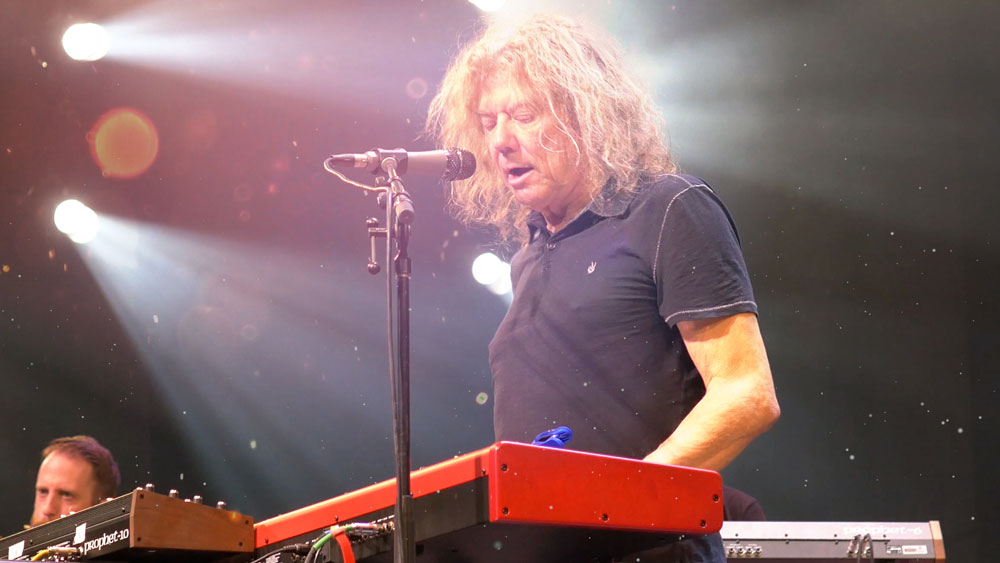
Listen Here Denver!: Jumping back to Remain In Light. I’m sure you’re aware that back in 1996, the band Phish covered Remain In Light in its entirety at their Halloween show.
Adrian Belew: Yes, I am aware of that. Sure.
Listen Here Denver!: I’m curious what that did for the music, what your reaction to that was, and if you’ve ever talked to Trey Anastasio about it.
Adrian Belew: I never listened to that music. I don’t listen to much other music and I don’t know what Jerry thought about it. However, when we did our very first Remain In Light show, it was a festival and the act before us was Oysterhead. After that show, I got a message that Trey Anastasio wanted to meet me so eventually I went over to their dressing room. Les Claypool was there and Stewart Copeland – who I’d done a record with – and then Trey walked in and kind of just went nuts. He said, you have no idea how much I love what you do. He told me that – and this was interesting as I knew about the Talking Heads thing they had done – but he said “what I really loved that you did is a band called The Bears.” So that was interesting to me. That was the one thing out of my career that he picked.
Listen Here Denver!: Really interesting.
Adrian Belew: Another band dear to my heart, but not very well known to many people.
Listen Here Denver!: Yeah, I discovered him doing some research for this interview, so that’s fantastic. I’ll have to dive into some of that music.
Adrian Belew: Well, there you go.
Listen Here Denver!: Excellent. Adrian, I really appreciate the time, and I hope rehearsal goes well, and I’m looking forward to checking out the show tomorrow night.
Adrian Belew: Me too. I’m really looking forward to being there and getting this tour started, and I think it’s going to be a great show. Please don’t miss it. We have a lot of fun, and the audience, you can tell, is just having a great time.
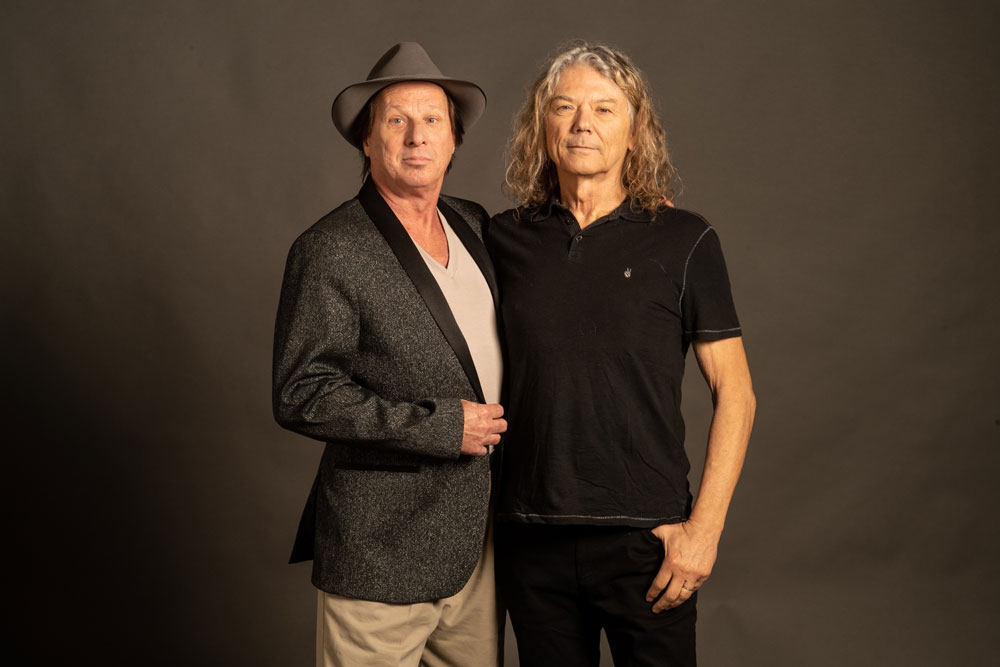
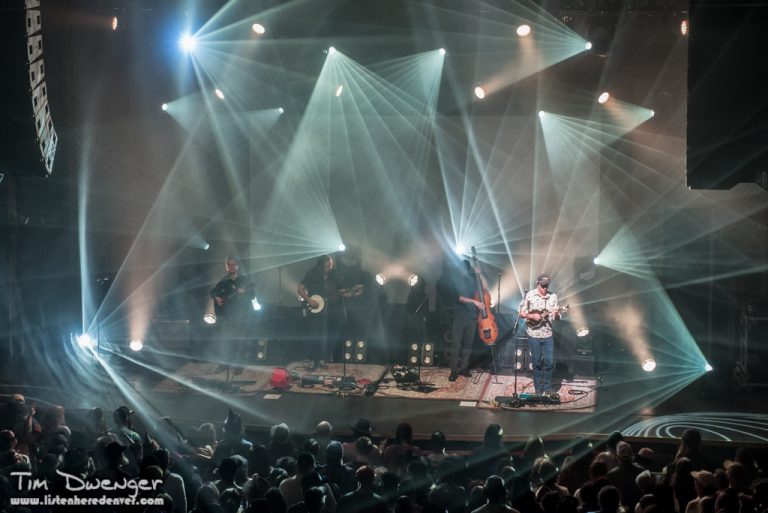
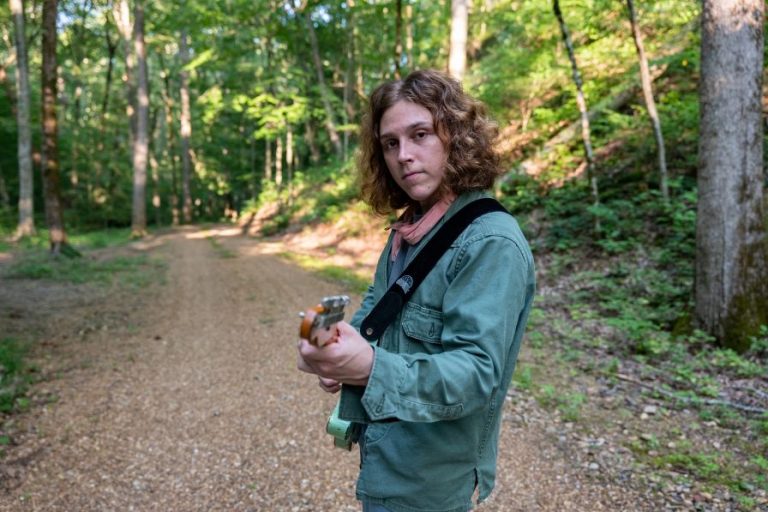
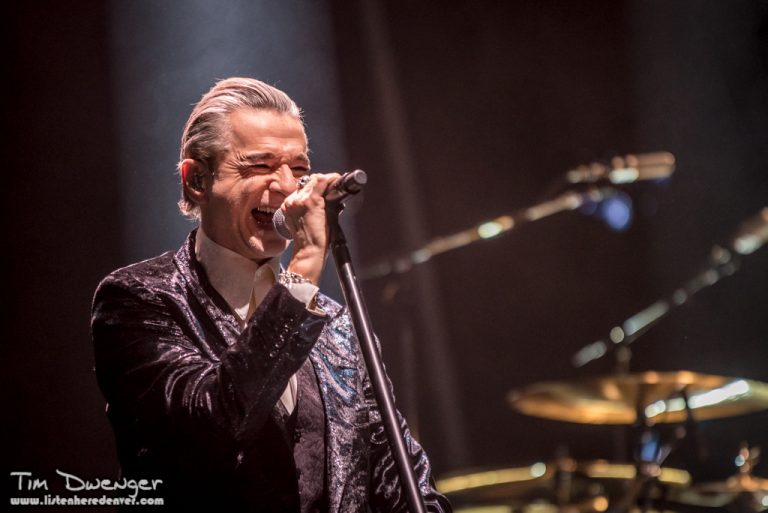
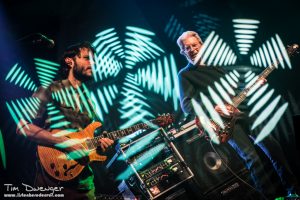
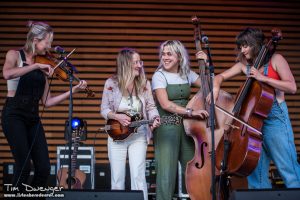
+ There are no comments
Add yours